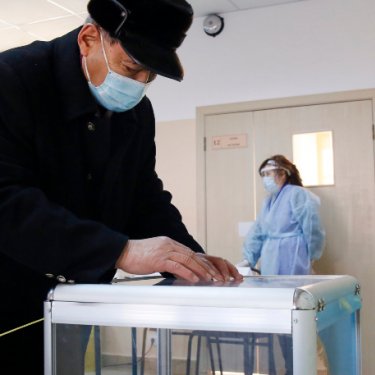Reporters prevented from covering Kazakh parliamentary elections

Reporters Without Borders (RSF) is appalled by the way officials obstructed reporters during the parliamentary elections in Kazakhstan on 10 January, often using Covid-19 regulations as a pretext, and calls on the Kazakh authorities to shed light on these press freedom violations.
At least four journalists were refused access to polling stations on 10 January. They include Ayan Kalmurat of Radio Azattyk (Radio Liberty/Radio Free Europe’s Kazakh-language service) and Saule Sadyenova of the independent news website Orda.kz, who were barred on the grounds of not having Covid-19 test results, although they are not obligatory for journalists. Just before the start of vote counting, Nasha Gazeta reporter Georgy Govorov was suddenly denied access to a polling station on the grounds that a health measure allegedly limited the number of observers, although he had been covering the voting there throughout most of the day.
In a polling station near Almaty, the country’s biggest city, Radio Azattyk reporter Asylkhan Mamashuly told supervisors he saw some voters place two or even three ballots in the ballot box. The chief supervisor responded by telling him he had to leave because the Almaty region was in the coronavirus infection risk “yellow zone” and he could therefore not stay in the polling station more than five minutes.
“The obstruction of media coverage of the elections casts doubt on the tentative transition towards freedom of expression in Kazakhstan and the credibility of President Kassym-Jomart Tokayev’s reformist discourse,” said Jeanne Cavelier, the head of RSF’s Eastern Europe and Central Asia desk. “We urge the authorities to investigate these violations and to undertake to respect article 19 of the International Covenant on Civil and Political Rights, which Kazakhstan ratified in 2006.”
Policemen followed several journalists of the weekly Uralskaya Nedela on polling day and tried to confiscate the phones of Radio Azattyk reporters Dilara Isa et Saniya Toiken. A police officer also deleted several videos that Toiken had recorded on polling day in Nursultan, the capital.
Localized Internet cuts were reported on polling day in several Almaty districts when demonstrations were taking place there. Aysana Ashim, the founder of the local news website The Village, said she lost her entire mobile Internet connection while participating in one of these demonstrations.
After 30 years of absolute rule, President Nursultan Nazarbayev finally stood down in March 2019, making way for Tokayev, who portrays himself as a reformer. Kazakhstan is ranked 157th out of 180 countries in RSF's 2020 World Press Freedom Index.


